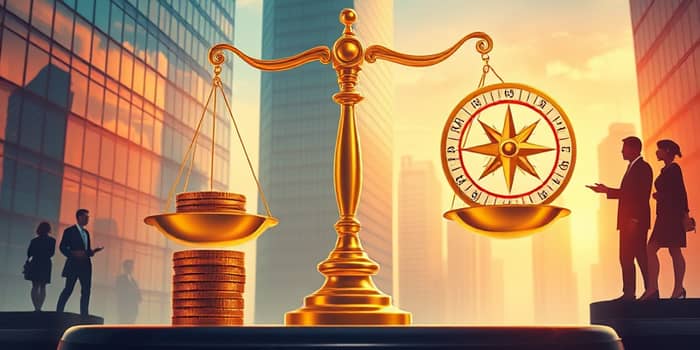
In today’s complex economic landscape, financial professionals frequently face choices that pit profitability against moral responsibility. Understanding these conflicts can protect investors, firms, and society at large.
This article offers a comprehensive exploration of ethical pitfalls in finance, examining real-world scandals, underlying causes, broad impacts, and actionable solutions that foster integrity.
Ethical dilemmas arise when professionals must choose between competing values or standards, often under institutional pressure. At their core, these dilemmas highlight a conflict between profit motives and ethics.
Such clashes can originate from personal ambition escalating into greed, or from organizational directives that reward revenue generation over client welfare. When incentives are misaligned, honest practices may be compromised.
Several high-profile scandals illustrate the scale and severity of ethical breaches in finance. These cases span geographies and reveal systemic vulnerabilities.
Organizational culture often drives unethical acts. When leadership emphasizes aggressive sales targets, employees may feel compelled to cut corners or ignore red flags.
Misaligned reward structures and misaligned incentives and customer needs can inadvertently encourage misconduct. Regulatory loopholes and inconsistent enforcement further embolden risky behavior.
Additionally, gaps in ethics training and a lack of robust reporting channels allow small infractions to escalate into large-scale scandals.
Economic fallout from major scandals can trigger market instability, erode investor confidence, and even precipitate financial crises. The 2008 meltdown and Enron’s collapse underscore how corporate misconduct harms entire economies.
Reputational damage often persists long after penalties are paid. Firms like Wells Fargo and HSBC continue to rebuild trust years after their settlements, facing ongoing scrutiny from customers and regulators.
In response to high-profile failures, legislatures worldwide have enacted stricter rules. Measures like the Sarbanes-Oxley Act mandate transparent disclosures and heightened board oversight.
Many ethical challenges dwell in ambiguous territory. Determining how much risk disclosure is sufficient, or where insider knowledge crosses the legality line, involves complex judgments. Sales teams must balance performance targets without exploiting uninformed clients.
Leaders also face trade-offs between shareholder demands and broader social responsibilities. These persistent gray areas demand nuanced policies and vigilant oversight.
True ethical leadership emerges when executives take unpopular stands to uphold integrity. Leaders who champion compliance, even at the cost of short-term profits, set a tone that empowers employees to act ethically.
Post-scandal reforms demonstrate how cultural transformation can occur. Companies that embrace whistleblower feedback, revise incentive systems, and prioritize transparency often recover stronger and more resilient.
Lessons learned from past failures emphasize the importance of early warning systems, clear communication of ethical standards, and continuous monitoring of risk indicators.
The financial world’s most pressing dilemmas stem from human psychology, organizational design, and evolving market forces. By studying case studies, understanding root causes, and implementing best practices, stakeholders can foster a culture of trust and accountability.
Key questions to consider: How can firms better align incentives with ethical outcomes? What systemic reforms are most urgent? Can innovation and integrity truly coexist? Reflecting on these challenges paves the way for a more transparent, equitable financial future.
References





